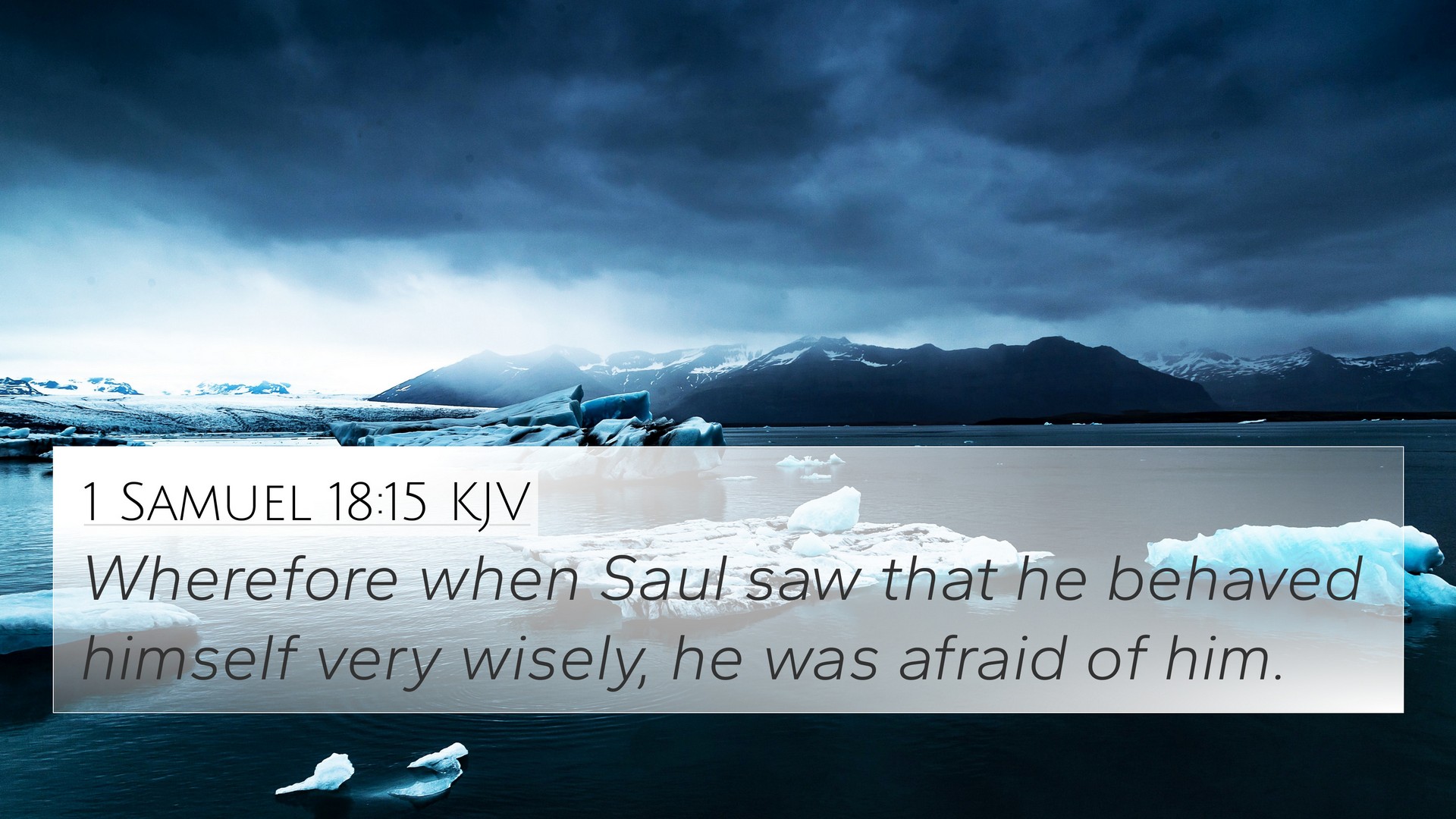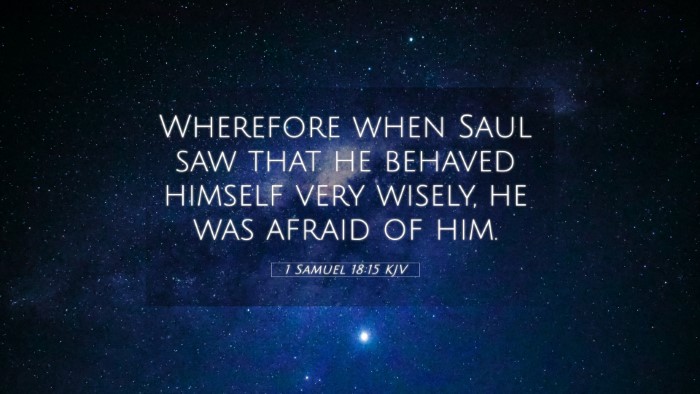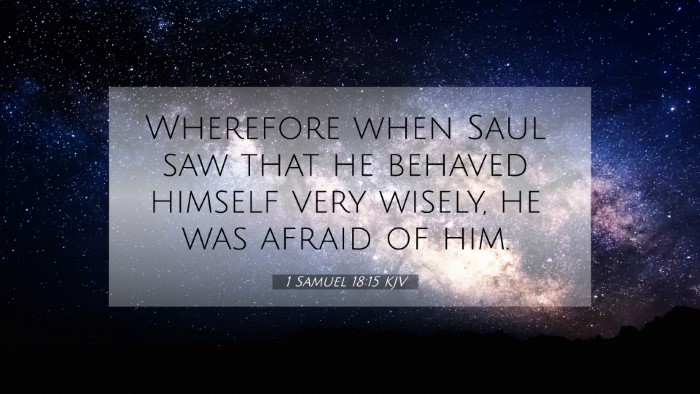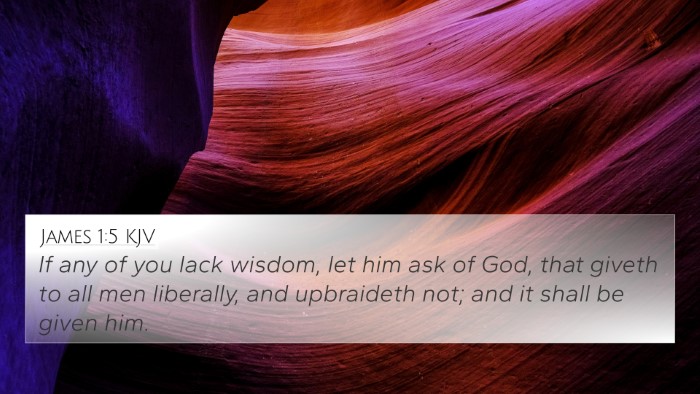Understanding 1 Samuel 18:15
1 Samuel 18:15 states: "When Saul saw that he behaved very wisely, he was afraid of him." This verse emerges from the intricate relationship between King Saul and David, highlighting the growing tension and fear that Saul harbors towards the young shepherd-turned-hero. Below, we combine insights from several public domain commentaries to explore the breadth and depth of this verse's meaning.
Context and Background
This verse is situated in a critical narrative of the Old Testament, following David's victory over Goliath. After this triumph, David begins to gain popularity among the people, which stirs jealousy and fear in King Saul. David is portrayed as wise in his actions, further intensifying Saul's apprehension.
Commentary Insights
Matthew Henry
According to Henry, Saul's fear stems not from David’s actions themselves, but from their implications. David's increasing success and wisdom alarm Saul as he realizes he is losing his grip on power. This commentary emphasizes the theme of jealousy in leadership and the dangers it poses.
Albert Barnes
Barnes notes that Saul's fear is irrational yet deeply rooted in his insecurities. He becomes paranoid about David's growing stature and his own declining authority. This points to a psychological struggle that often accompanies leadership when it is challenged.
Adam Clarke
Clarke elaborates on the idea that Saul's fear is indicative of divine displeasure. As David is favored by God, Saul realizes that his own reign is precarious. This commentary considers the spiritual dimensions of leadership and the consequences of divine favor upon individuals.
Thematic Connections
This verse touches on numerous themes relevant throughout the Bible, particularly jealousy, divine favor, wisdom, and leadership dynamics. By understanding these themes, we can identify connections between various biblical texts.
Cross-References
- 1 Samuel 16:7 - The Lord looks at the heart, contrasting God's choice of David with Saul's natural appearance.
- 1 Samuel 18:9 - Saul's growing suspicion leads him to keep a jealous eye on David.
- 1 Samuel 19:1 - Saul's jealousy escalates to a desire to kill David.
- Psalm 37:1-2 - A reflection on not fretting because of evildoers, which aligns with David’s situation.
- Matthew 20:26-27 - The concept of servant leadership contrasts Saul's ruling style with Jesus' teachings.
- James 3:16 - The destructive nature of jealousy and self-seeking aligns with Saul’s behavior.
- Philippians 2:3 - Encouragement against selfish ambition resonates with Saul’s actions.
Connecting Biblical Themes
Understanding 1 Samuel 18:15 requires recognizing how it fits within broader scriptural narratives. This verse is not isolated; it invites deeper reflection on:
- Jealousy as a recurrent theme in leadership (e.g., Joseph and his brothers).
- The role of divine selection versus human authority (e.g., King David's anointing).
- Contrast of wisdom in governing (e.g., Solomon's plea for wisdom).
Application for Today
This verse’s implications extend beyond the historical context and inspire ethical considerations for contemporary leaders. Its lessons include:
- The importance of humility in leadership.
- Recognizing and addressing feelings of jealousy in personal and community relationships.
- How to respond wisely to competition and success in others.
Conclusion
1 Samuel 18:15 encapsulates a pivotal moment in the biblical narrative, filled with themes of jealousy, divine favor, and the complexity of human emotions in leadership. By exploring this verse through various commentaries, we find rich insights that connect it to broader biblical principles, providing a comprehensive understanding of its significance.
Further Study Tools
For those interested in deepening their understanding, several tools can assist with cross-referencing and biblical analysis:
- Bible concordance for locating related passages.
- Bible cross-reference guide for thematic studies.
- Resources for cross-referencing Bible study methodologies.
By utilizing these tools, one can effectively engage in the comparative analysis of Bible verses and identify inter-biblical dialogues that enrich one's understanding of scriptural connections and themes.







